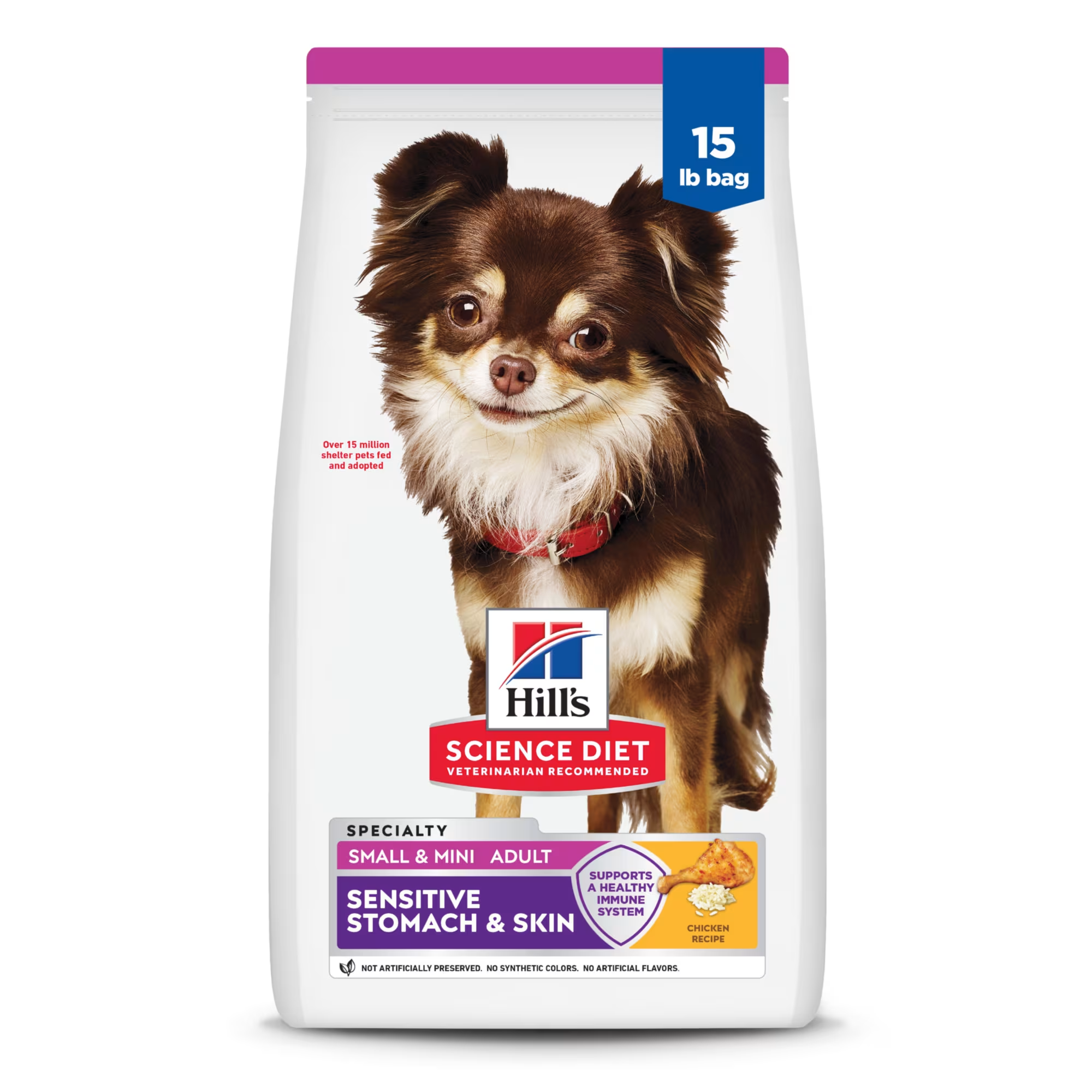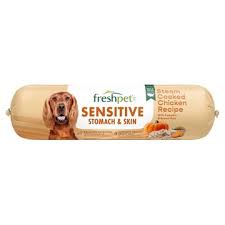Puppy food for sensitive stomachs should be easily digestible and contain limited ingredients. Choose formulas with prebiotics, probiotics, and high-quality proteins for optimal gut health.
Selecting the right food for a puppy with a sensitive stomach is crucial for their development and overall health. Puppies require nutrient-rich diets to grow, but those with gastrointestinal sensitivities need specially formulated food that won't upset their stomachs. The key is to find a balance between wholesome nutrition and gentleness on the digestive system.
Look for puppy food that includes easily digestible proteins, a simple ingredient list to minimize potential allergens, and components that support a healthy gut microbiome, such as prebiotics and probiotics. Always consult with a veterinarian before switching your puppy's diet to ensure the food meets their specific dietary needs and promotes their well-being.
Introduction To Sensitive Stomachs In Puppies
Common Signs Of Sensitivity
A puppy's sensitive stomach can manifest in various ways. Here are the signs to watch for:- Frequent vomiting or gagging
- Diarrhea or loose stools
- Lack of appetite or picky eating
- Excessive gas or burping
- Abdominal discomfort, often shown by a hunched back
Why Some Puppies Have Delicate Digestion
Several factors contribute to a puppy's sensitive stomach:| Factor | Description |
|---|---|
| Genetic predisposition | Some breeds have inherent sensitivities. |
| Underdeveloped digestive system | Puppies' systems are still maturing. |
| Dietary changes | Sudden food switches can cause upset. |
| Food intolerances | Some ingredients trigger adverse reactions. |
| Overfeeding | Too much food can be hard to process. |

Importance Of Proper Nutrition
Link Between Diet And Digestive Health
A puppy's diet directly affects its stomach health. Good food means a happy tummy. It helps digestion and nutrient absorption. Bad food can cause upset stomachs and diarrhea. Puppies with sensitive stomachs need diets tailored to their needs. Key points:- Quality ingredients support digestive health.
- Probiotics in food help balance gut bacteria.
- Fiber aids in smooth digestion.
Long-term Effects Of A Suitable Diet
The right diet has lasting benefits. It keeps puppies healthy as they grow. A suitable diet can prevent future health issues. It can also reduce the risk of chronic diseases.| Benefit | How It Helps |
|---|---|
| Strong Immunity | Protects from sickness |
| Healthy Weight | Prevents obesity |
| Good Energy Levels | Keeps puppies active |
Identifying Food Allergies And Intolerances
Symptoms Of Food Allergies In Puppies
Food allergies can make your puppy feel bad. Here are signs to watch:- Itchy skin – Your puppy may scratch a lot.
- Ear infections – Frequent ear problems can be a clue.
- Diarrhea – Loose stools may point to an allergy.
- Vomiting – Some puppies may throw up often.
- Paw licking – This can show skin irritation.
Steps To Diagnose Food Intolerances
Diagnosing food intolerances involves a few key steps:- Visit a vet – Always start with professional advice.
- Food elimination diet – Remove common allergens for 8-10 weeks.
- Observe changes – Note any improvements in symptoms.
- Reintroduce foods – Slowly add foods back and watch for reactions.
- Identify the culprit – Find which food causes the problem.

Ingredients To Avoid For Puppies With Sensitive Stomachs
Common Irritants In Puppy Food
- Grains like wheat and corn can be hard on puppy stomachs.
- Dairy products are tough for puppies to digest.
- Artificial additives, including colors and flavors, may cause reactions.
- High-fat foods can upset their small digestive systems.
Reading Labels: Red Flags To Look Out For
Labels tell us a lot about what's in puppy food. Spotting red flags helps avoid upset stomachs.| Ingredient | Why to Avoid |
|---|---|
| By-products | Low quality, hard to digest. |
| Artificial preservatives | Can cause allergies and other health issues. |
| Sweeteners | Unnecessary and unhealthy for puppies. |
| Excessive salt | Bad for the puppy's heart and blood pressure. |
Key Ingredients For Soothing A Sensitive Stomach
Beneficial Fibers And Probiotics
Dietary fibers and probiotics are stomach soothers. They aid digestion and promote gut health. Let's look at why they're important.- Fibers like beet pulp and inulin support regular bowel movements. They also maintain a healthy gut environment.
- Probiotics are good bacteria. They balance the gut flora. This helps to reduce digestive upset.
Proteins That Are Gentle On The Stomach
Easily digestible proteins are crucial. They provide energy without the tummy ache.| Protein Source | Benefits |
|---|---|
| Chicken | Lean and mild, good for sensitive pups. |
| Lamb | Rich in nutrients, rarely causes allergies. |
| Fish | Omega fatty acids help with inflammation. |

Top Puppy Food Brands For Sensitive Stomachs
Reviews Of Specialized Formulas
Specialized puppy food brands understand sensitive stomachs. They craft recipes with high-quality ingredients. These brands prioritize digestive health.- Blue Buffalo – Offers grain-free options.
- Hill's Science Diet – Veterinarians often recommend this.
- Royal Canin – Tailors food for specific breeds.
- Wellness Simple – Known for limited-ingredient diets.
- Canidae – Uses whole foods for easier digestion.
What Veterinarians Recommend
Veterinarians suggest foods that support a puppy's development and digestive health. They recommend brands with:- Probiotics for gut health.
- Quality proteins for muscle growth.
- Easy-to-digest carbohydrates.
- Fatty acids like DHA for brain development.
Homemade Diets And Natural Remedies
Safe Recipes For Homemade Puppy Food
Making your puppy food ensures quality and simplicity. Start with easily digestible proteins like cooked chicken or turkey. Add cooked vegetables like pumpkin or sweet potatoes. These veggies are gentle on the stomach. Finally, a small portion of cooked rice or oatmeal can provide carbohydrates for energy.- Boiled Chicken and Rice: A classic, bland meal that's easy on the tummy.
- Pumpkin Puree Mix: Great for digestion, mix it with protein.
- Ground Turkey and Sweet Potato: A nutrient-rich, low-fat option.
| Ingredient | Amount | Benefit |
|---|---|---|
| Cooked Chicken | 2 Cups | Protein |
| Cooked Rice | 1 Cup | Energy |
| Pumpkin Puree | 1/2 Cup | Digestive Aid |
Natural Supplements That Aid Digestion
Natural supplements can enhance a puppy's digestive health. Probiotics, for example, balance gut bacteria. Omega-3 fatty acids reduce inflammation. Always consult a vet before adding supplements to your puppy's diet.- Probiotics: These support a healthy gut environment.
- Omega-3 Fatty Acids: Found in fish oil, they soothe the digestive tract.
- Digestive Enzymes: Help break down food, making it easier to digest.
Transitioning To A New Food
How To Introduce New Food Safely
Puppies need a slow switch to new food. Their tummies are delicate. Start by mixing a bit of the new food with their current one. Gradually increase the new food amount. This should take about 7-10 days.- Day 1-3: Serve 75% old food with 25% new food.
- Day 4-6: Mix old and new food half-and-half.
- Day 7-9: Shift to 25% old food and 75% new food.
- Day 10: Serve 100% new food.
Monitoring Your Puppy’s Response To Dietary Changes
Watch your puppy's health as you switch foods. Look for signs of a happy puppy. This includes good energy, firm stools, and no vomiting. If issues arise, slow down the transition.| Signs to Watch | Good Response | Poor Response |
|---|---|---|
| Energy Levels | Active and playful | Lethargic or tired |
| Stool Quality | Firm and regular | Loose or irregular |
| Digestive Sounds | Quiet | Loud or frequent gurgling |
Consulting With A Veterinarian
When To Seek Professional Advice
Puppies often show signs when their stomachs are upset. These include vomiting, diarrhoea, and a lack of appetite. Don't wait if your puppy exhibits these symptoms frequently. Immediate vet consultation is essential to prevent more serious issues.The Role Of Specialized Veterinary Diets
Veterinarians may suggest specialized diets. These are formulated to be gentle on your puppy's stomach. Specialized diets often contain:- Highly digestible proteins
- Easily absorbable carbohydrates
- Supplements like probiotics
Maintaining Digestive Health
Regular Check-ups And Preventive Care
Visiting the vet often keeps puppies healthy. Vets can spot problems early. They give vaccines and treatments that stop sickness. This care helps the stomach too.- Yearly exams: Check health and catch issues early.
- Deworming: Prevents worms that can upset the stomach.
- Diet advice: Vets suggest the best food for sensitive stomachs.
Lifestyle Factors That Support Digestive Well-being
A happy lifestyle means a happy stomach. Certain habits boost gut health.- Regular meals: Eating at the same time helps digestion.
- Gentle exercise: Walking after eating aids in food breakdown.
- Stress-free environment: Stress hurts the stomach. Keep puppies calm.
| Tips | Benefits |
|---|---|
| Small, frequent meals | Less strain on the stomach |
| Plenty of water | Helps digestion |
| Probiotics | Supports gut bacteria |
Frequently Asked Questions About Puppy Food for Sensitive Stomach
What Is A Sensitive Stomach In Puppies?
A sensitive stomach in puppies refers to digestive issues that cause discomfort, often resulting in symptoms like diarrhoea or vomiting after eating.
How To Identify Food Allergies In Puppies?
Look for signs like itching, excessive licking, or gastrointestinal upsets, which can indicate food allergies in puppies.
What Ingredients Should Puppy Food Avoid?
Puppy food should avoid artificial additives, fillers, common allergens like corn, soy, and sometimes chicken, and excessive grains.
Is Grain-Free Puppy Food Better For Sensitive Stomachs?
Grain-free puppy food can be better for some puppies with sensitivities, but it's not universally the best choice for every puppy with a sensitive stomach.
Can Puppies With Sensitive Stomachs Eat Wet Food?
Yes, puppies with sensitive stomachs can eat wet food; it's often easier to digest and more palatable.
What Are The Best Proteins For Puppies With Sensitive Stomachs?
Easily digestible proteins for puppies include lean meats like turkey, lamb, or fish that are less likely to cause stomach upset.
How Often Should I Feed A Puppy With A Sensitive Stomach?
Feed small, frequent meals to puppies with sensitive stomachs to ease digestion and reduce gastrointestinal stress.
Can Probiotics Help Puppies With Sensitive Stomachs?
Probiotics can aid in digestive health by balancing gut bacteria, which may help puppies with sensitive stomachs.
What Is A Limited Ingredient Diet For Puppies?
A limited-ingredient diet for puppies contains fewer components, reducing the chance of triggering a food sensitivity or allergy.
How To Transition Puppy To A New Food?
Transition your puppy to the new food gradually over 7-10 days, mixing increasing amounts of new food with the old to avoid digestive upset.
Conclusion
Choosing the right food for your puppy with a sensitive stomach is crucial. Emphasize natural, high-quality ingredients and consult a vet for personalized advice. Remember, a healthy diet leads to a happy, energetic puppy. Start with the recommendations from this post and observe your puppy's response for a smoother journey towards their well-being.














